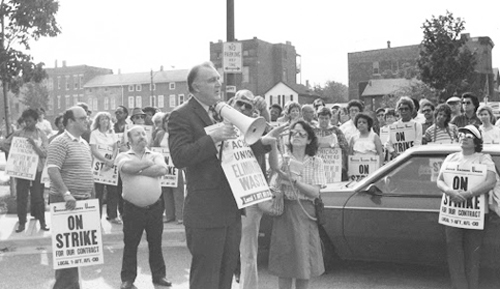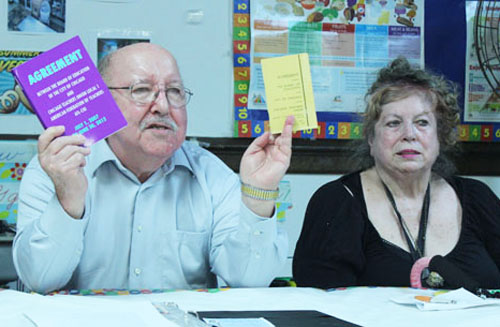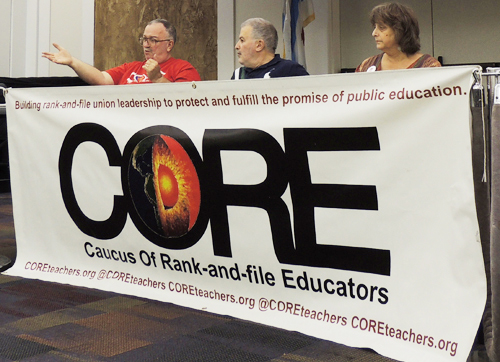STRIKEWATCH: Will CTU officers and staff follow the CTU tradition and suspend their own pay during the strike on April 1 -- and beyond if it comes to a strike in May and June?...
 Chicago Teachers Union President Robert M. Healey (above with bullhorn) spoke on many of the union's picket lines during the 1983 strike. Behind Healey with his arms folded is Paul Odell, who by the time of the 1983 strike was a union field representative, having served as a teacher, union delegate, and strike leader at Robert A. Black school before being hired by the CTU. By October 1983 when the 1983 strike was called following the refusal of Schools Supt. Ruth Love to negotiate in good faith with the CTU, the union's traditions were established. One of those was that when the strike began, Healey and the officers announced that nobody at the union's offices -- officers or staff like Odell -- would be paid until the strike was won. The principal was that the people who worked for the union would be making the same sacrifices being made by everyone who was not working out in the schools. History has always been a challenging reality when its "lessons" are utilized to influence or dictate current events. And so it is with the sometimes contentious but usually democratic history of the Chicago Teachers Union as the union moves towards the second strike since the current leadership took office in July 2010. And those contending histories are being fiercely debated, even today, as CTU members are asked to help build and finance a "movement" as well as to negotiate and protect their own contract.
Chicago Teachers Union President Robert M. Healey (above with bullhorn) spoke on many of the union's picket lines during the 1983 strike. Behind Healey with his arms folded is Paul Odell, who by the time of the 1983 strike was a union field representative, having served as a teacher, union delegate, and strike leader at Robert A. Black school before being hired by the CTU. By October 1983 when the 1983 strike was called following the refusal of Schools Supt. Ruth Love to negotiate in good faith with the CTU, the union's traditions were established. One of those was that when the strike began, Healey and the officers announced that nobody at the union's offices -- officers or staff like Odell -- would be paid until the strike was won. The principal was that the people who worked for the union would be making the same sacrifices being made by everyone who was not working out in the schools. History has always been a challenging reality when its "lessons" are utilized to influence or dictate current events. And so it is with the sometimes contentious but usually democratic history of the Chicago Teachers Union as the union moves towards the second strike since the current leadership took office in July 2010. And those contending histories are being fiercely debated, even today, as CTU members are asked to help build and finance a "movement" as well as to negotiate and protect their own contract.
But when it comes to a CTU strike, the history has always been precise: nobody works for pay during a strike. Striking is union work for everyone in and at the union. Although it is buried deep into records that at least a faction of the leadership of the Chicago Teachers Union might not want to archive, the fact is that during every CTU strike through 1987, the union's officers and staff announced as soon as the strike began that they would not be getting paid until the strike ended. The announcement, usually made at a House of Delegates meeting, was a long-standing tradition in the union. It was not made before or during the Chicago Teachers Strike of 2012 and has as of yet not been made regarding the upcoming strike on April 1, 2016.
The reasoning behind the decision that nobody in the CTU was paid during a strike was simple. If the union's dues-paying members were forgoing their pay based on the principals involved in striking, the union's leaders -- from the officers through the ranks of everyone working at the union's offices -- would do the same. It was an important fact that helped the union members over time understand how unionism works.
 During the months leading up to the Chicago Teachers Strike of 2012, Substance and CORE sponsored a number of forums on the union's strike and contract histories. Above, speaking at one of those forums are Paul Odell and Lotty Blumenthal. Odell is holding up a copy of the (then) current contract (in his right hand) and the union's first written contract (in his left hand). Odell, Blumenthal and many others who helped with the history forums has participated in every CTU strike beginning in the 1960s. As the speakers at the history forums prior to the Chicago Teachers Strike of 2012 noted, one of the first actions during any strike was the announcement by the officers and staff that they would not be paid until the strike was over and the new union contract had been won. A big question arising as the April 1 strike looms is how the union is going to identify and penalize the SCABs. While there has been a great deal of media attention to those who are threatening to SCAB, no one will know who is really a SCAB until the strike actually happens. Contrary to what some among the CTU's current leaders have said in public, identifying a SCAB is not "name calling." It is one of the most basic acts of unionism.
During the months leading up to the Chicago Teachers Strike of 2012, Substance and CORE sponsored a number of forums on the union's strike and contract histories. Above, speaking at one of those forums are Paul Odell and Lotty Blumenthal. Odell is holding up a copy of the (then) current contract (in his right hand) and the union's first written contract (in his left hand). Odell, Blumenthal and many others who helped with the history forums has participated in every CTU strike beginning in the 1960s. As the speakers at the history forums prior to the Chicago Teachers Strike of 2012 noted, one of the first actions during any strike was the announcement by the officers and staff that they would not be paid until the strike was over and the new union contract had been won. A big question arising as the April 1 strike looms is how the union is going to identify and penalize the SCABs. While there has been a great deal of media attention to those who are threatening to SCAB, no one will know who is really a SCAB until the strike actually happens. Contrary to what some among the CTU's current leaders have said in public, identifying a SCAB is not "name calling." It is one of the most basic acts of unionism.
One of the biggest scandals of the administration of Marilyn Stewart was that Stewart hired a SCAB (a personal friend) named Tracy Cobb Evans to be the union's Springfield representative. When Substance finally was able to report that we had verified that a highly paid union official was a SCAB (during the 1987 strike), it was only after learning the history and verifying it independently of the union's official records. For some reason, the scab records from the 1987 strike had disappeared from the CTU offices.
For all the talk of "transparency" in the 21st Century, the problem of disappearing records at the CTU -- and the lack of a CTU research library -- continues to challenge those who (like this reporter) insist that the union's 28,000 members are best served by accuracy and what the jargon of today calls "transparency."
During 2015, as all the teacher members of the CTU know (especially now that it's tax season), the teachers who are members of the Chicago Teachers Union each paid $1,059 in union dues. In many cases, the union's members have learned, often the hard way, that the union contract they won by the Chicago Teachers Strike of 2012 was a weak one. Not only were union raises during the four years of the contract the lowest in the past quarter century, but the supposedly "good" parts of the Agreement (like an "anti bullying" article and stuff about eliminating "paperwork") were undercut either by confusion about how the union enforces the rights of those who pay its dues, or by virtue of the fact that the Board of Education built in loopholes that weren't seen until it was too late.
 One of the forums sponsored by CORE prior to the Chicago Teachers Strike of 2012 heard from (left to right above) George N. Schmidt, Jack Silver, and Miriam Socoloff about the strike battles and contracts of the late 20th Century. Schmidt, Silver and Socoloff are still active members of CORE and members of the CTU House of Delegates, now representing retired members. During their days as active duty teachers, all of them were school delegates. Schmidt served as a delegate from several schools, for the longest times Amundsen and Bowen High School. Silver was delegate for Jackie Robinson Elementary School, and Socoloff was delegate from King High School, Julian High School, and Lakeview High School. Substance photo by Scott Saffro.Prior to the Chicago Teachers Strike of 2012, CORE (the Caucus Of Rank and file Educators) hosted a number of forums on the union's militant history and traditions. As part of CORE's early push for more transparency in the CTU, the caucus, in partnership with Substance, also produced a video about the history of the strikes of the 20th Century. Similar events have not yet been held in 2015 and 2016 as the Board of Education's veteran negotiators continue to stall negotiations and repeat the same talking points that veteran CTU members first heard during the 1960s and 1970s, when the union began striking even before it was legal to strike under the labor laws of the State of Illinois.
One of the forums sponsored by CORE prior to the Chicago Teachers Strike of 2012 heard from (left to right above) George N. Schmidt, Jack Silver, and Miriam Socoloff about the strike battles and contracts of the late 20th Century. Schmidt, Silver and Socoloff are still active members of CORE and members of the CTU House of Delegates, now representing retired members. During their days as active duty teachers, all of them were school delegates. Schmidt served as a delegate from several schools, for the longest times Amundsen and Bowen High School. Silver was delegate for Jackie Robinson Elementary School, and Socoloff was delegate from King High School, Julian High School, and Lakeview High School. Substance photo by Scott Saffro.Prior to the Chicago Teachers Strike of 2012, CORE (the Caucus Of Rank and file Educators) hosted a number of forums on the union's militant history and traditions. As part of CORE's early push for more transparency in the CTU, the caucus, in partnership with Substance, also produced a video about the history of the strikes of the 20th Century. Similar events have not yet been held in 2015 and 2016 as the Board of Education's veteran negotiators continue to stall negotiations and repeat the same talking points that veteran CTU members first heard during the 1960s and 1970s, when the union began striking even before it was legal to strike under the labor laws of the State of Illinois.
And so, as a matter of history in April 2016 and should the CTU strike in May 2016, one question that needs to be answered is whether the union's officers and workers are making the same sacrifices during the strike as the members are? The answer is not as of March 30, 2016, anywhere to be found on the public record of the CTU, or in any available information.

